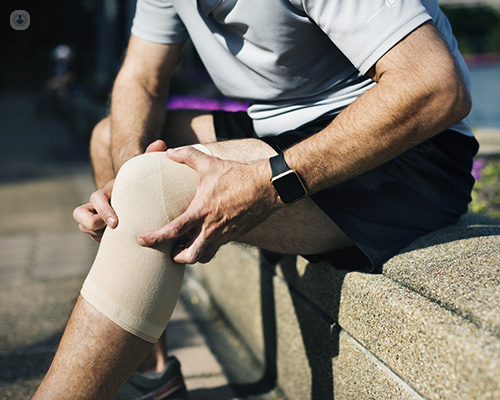

What is Hoffa’s syndrome?
Hoffa’s syndrome, also known as infrapatellar fat pad syndrome, is a problem which affects one of three pads of fatty soft tissue that lies under the kneecap (patella) and leads to pain at the front of the knee. The Hoffa’s fat pad acts as a protective cushion, which separates the kneecap from the shin and thigh bones. If this becomes pinched, squashed or damaged, it becomes swollen, inflamed and sore. It increases in size after it has become swollen, and is more likely to get pinched again. This cycle can lead to a lot of pain the front of the knee that is hard to get rid of.

What causes Hoffa’s syndrome?
Hoffa’s syndrome can happen for a number of reasons. It could be caused by a sudden injury, such as a direct hit to the knee. It tends to gradually develop over time if the knee is repeatedly extended. This is when the knee is forced beyond its fully straightened normal position. The patient may have a history of being able to over-straight the knee, which is known as hyperextension. Other causes include tight quadriceps, forward tipping of the pelvis or a history of osteoarthritis in the knee.
What are the symptoms?
The symptoms of Hoffa’s syndrome include pain at the front and side of the knee. This is often hard to pinpoint and there has been no clear injury. Activities such as climbing the stairs, or even sitting with the knee bent are painful. In some cases there is a background ache and occasional jolts of sharp pain. Generally, there is swelling below and around the knee, pain in straightening the knee, or with prolonged walking.
How is Hoffa’s syndrome diagnosed?
A physiotherapist, orthopaedic specialist, or sports doctor will look for the symptoms mentioned above. They will perform a clinical examination called Hoffa’s test, which involves moving the kneecap after the patient contracts the quadriceps muscles.
How is Hoffa’s syndrome treated?
Hoffa’s syndrome is treated by firstly calming down the inflammation and secondly stopping the pinching and squashing. This can be achieved with rest and medicines. Further treatments include taping the knee and strengthening exercises. It may be advised to see a sports medicine professional, such as a physiotherapist or an orthopaedic surgeon. The specialist can apply a small anti-inflammatory injection to the fat pad, to calm the inflammation and to physically shrink the Hoffa’s fat pad. If the condition is severe then up to three injections are needed. Surgery is not usually a recommended treatment for Hoffa’s syndrome but in rare cases, a gentle minor surgery to trim out some of the inflamed fat pad can be performed.
